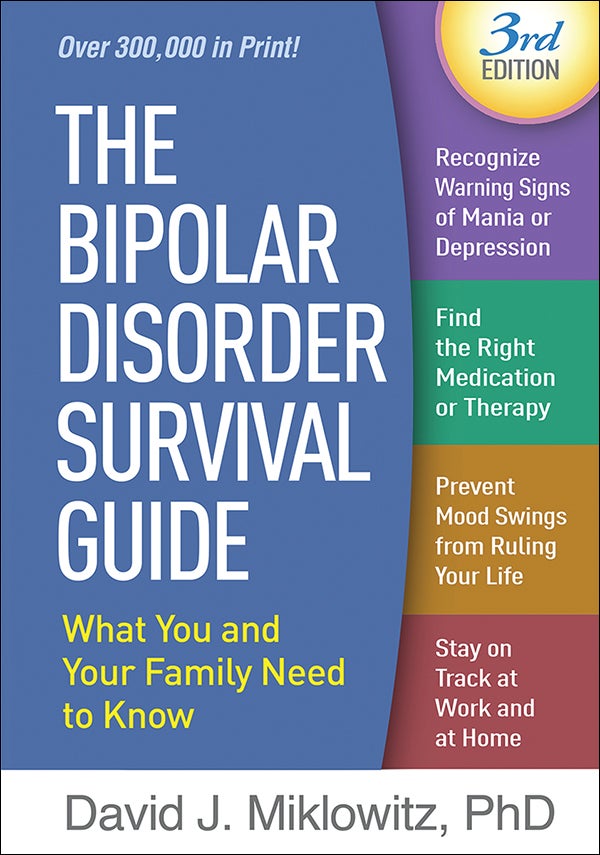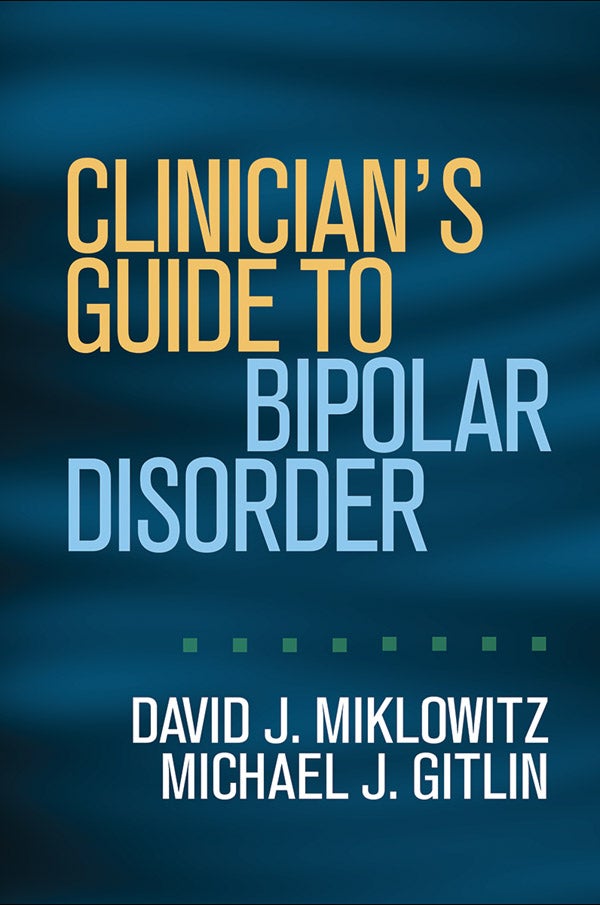Books
 |
 |
The Bipolar Disorder Survival Guide, Third Edition: What You and Your Family Need to Know
Available wherever books are sold!
Description
Bipolar disorder is a lifelong challenge—but it doesn't have to rule your life. Find the science-based information you need in the revised third edition of this indispensable guide. Trusted authority Dr. David J. Miklowitz shares proven strategies for managing your illness or supporting a loved one with the disorder. Learn specific steps to cope with mood episodes, reduce recurrences, avoid misdiagnosis, get the most out of treatment, resolve family conflicts, and make lifestyle changes to stay well. Updated throughout, the third edition has a new chapter on kids and teens; the latest facts on medications and therapy, including important advances in personalized care; and expanded coverage of the bipolar II subtype. It features boxes on complementary and alternative treatments and provides downloadable practical tools.
Praise
“The author's expertise, compassion, and experience are evident throughout....Well worth reading and remembering.” —NAMI Advocate (on the first edition)
“Recommended for patient education libraries and medium and large public libraries.”—Library Journal (on the first edition)
“This book is a true gift. As parents, watching our daughter’s illness unfold was terrifying and heartbreaking. I only wish that Dr. Miklowitz’s book had been available then to help guide us on this rollercoaster of a journey. It not only gives sufferers and their family members a better understanding of bipolar disorder, but also shows how to achieve stable moods and lead a full life.”—Vicky G., Santa Monica, California
“A practical, straightforward book that will be a great help to those who have bipolar illness, as well as their families. I could not recommend this book more highly.” —Kay Redfield Jamison, PhD, author of An Unquiet Mind and Robert Lowell, Setting the River on Fire
“I used to spend way too much time searching the Internet for tips on managing my bipolar disorder. Now, whenever I need ideas about how to feel better, I just pick up The Bipolar Disorder Survival Guide. It is an incredible resource that gives me tons of new and effective coping strategies to try. Reading it, you'll feel like an expert is taking the time to really talk to you—it's clear that Dr. Miklowitz cares.”
—Christine S., Houston, Texas
“Dr. Miklowitz is an experienced therapist and skilled researcher whose decades of work with people with bipolar disorder shine through in this easy-to-follow book. If you or a loved one have bipolar disorder, I highly recommend this updated third edition.” —Mary A. Fristad, PhD, ABPP, Department of Psychiatry and Behavioral Health, The Ohio State University Wexner Medical Center
Clinician's Guide to Bipolar Disorder, by David J. Miklowitz and Michael J. Gitlin
Winner (First Place)—American Journal of Nursing Book of the Year Award, Psychiatric and Mental Health Nursing Category
Description
This much-needed volume gives clinicians essential strategies for managing the complexities of bipolar disorder and tailoring treatment to each patient's changing needs. Highly readable, accessible, and pragmatic, the book provides expert guidance on critically important treatment questions. It addresses which medications to try and at what dosages, what psychosocial interventions are most helpful at different phases of the illness, how to continually monitor and fine-tune treatment to keep patients functioning well, and how to involve family members productively. The authors draw on state-of-the-art research as well as extensive clinical experience as a psychotherapist and a psychopharmacologist. Vivid case material is included throughout. Reproducible questionnaires and forms can be downloaded and printed in a convenient 8½" x 11" size.
Praise
“There are, of course, a plethora of good books on this subject….What sets this work of Miklowitz and Gitlin apart is an emphasis on integrating psychopharmacology and psychotherapy as coequals and essential for maximizing treatment effectiveness and functional outcome. The authors are renowned researchers and clinicians who have collaborated for decades utilizing the knowledge and techniques they so cogently describe….Throughout the text are clinical vignettes that help illustrate how the authors have applied these concepts and recommendations that enliven the book and will resonate with any clinician who has worked with people who have bipolar disorder….This is as comprehensive a primer on bipolar disorder as one can find. It is well written by just two authors, leading to a uniformity of tone and lack of redundancy. It uniquely addresses blended treatment from the perspective of both a psychotherapist and a psychopharmacologist. If a clinician-in-training were to read only one book about this topic, they couldn’t do better than this one, and even seasoned clinicians would learn much from it, as did I.”—Journal of Clinical Psychiatry
“It will be extremely valuable for trainees and clinicians who are learning or struggling with the nuances of diagnosing and treating this complicated illness.”—Doody's Review Service
“An excellent guide to the treatment of a complicated, common, and potentially lethal illness. The authors' deep understanding of depression and mania is obvious on every page and their clinical recommendations are sophisticated and practical.”
—Kay Redfield Jamison, PhD, The Dalio Family Professor in Mood Disorders and Professor of Psychiatry, Johns Hopkins University School of Medicine
“Books about bipolar disorder abound, but what makes this one unique is that it clearly conveys that pharmacotherapy and psychotherapy must function as an integral whole. The authors' scholarly track records qualify them as experts, but beyond that, their real qualification is their decades of clinical experience. Two of the main emphases are especially gratifying to me: first, that treatment is a collaboration between doctor and patient, a truism often cited but rarely practiced; and second, that family members are integral to the treatment team. The extensive, well-chosen case examples bring the book alive and will help readers remember the many important clinical points.”
—Frederick K. Goodwin, MD, Director, Center on Neuroscience, Medical Progress, and Society, George Washington University Medical Center
“This is a marvelously written and practical book on treatment of the individual patient with bipolar disorder. It has many case examples of difficult problems that are commonly encountered, and multiple precise ways to deal with them. A major focus is integrating pharmacotherapy with psychotherapy, psychoeducation, and family involvement in the therapeutic process. If patients are treated according to the principles enumerated in this book, it is clear that they will do very well.”
—Robert M. Post, MD, Bipolar Collaborative Network, Bethesda, Maryland; Department of Psychiatry, George Washington University
“Miklowitz and Gitlin have teamed up to produce an invaluable volume. This unique book covers essentially everything the clinician needs to know to effectively diagnose and treat bipolar disorder in an integrated and personalized way. The chapters on treatment are particularly notable for distilling the wisdom of these two highly skilled experts into usable strategies and tactics that don't necessarily follow any single model of treatment, but integrate the most effective parts of several models. This is 'must' reading for clinicians who are embarking on the treatment of these challenging patients or who want to update their skills.”
—Ellen Frank, PhD, Distinguished Professor of Psychiatry and Professor of Psychology, University of Pittsburgh School of Medicine
“Miklowitz and Gitlin share a wealth of clinical pearls, providing clinicians with a road map for how to best diagnose bipolar disorder and promote mood stabilization and recovery. A great resource for clinicians, students, and the field.”
—Mark A. Frye, MD, Professor and Chair, Department of Psychiatry and Psychology, Mayo Clinic College of Medicine


